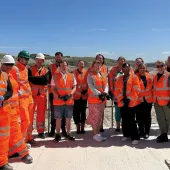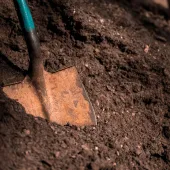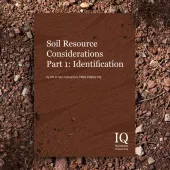Institute of Quarrying - The Modern Era

First published in the October 2017 issue of Quarry Management
Fourth part of a special supplement by Quarry Management to celebrate IQ's centenary
In IQ terms, the modern era commenced in September 2012 when the Institute and its staff completed the move out of the office at 7 Regent Street, Nottingham, which it had shared with QMJ for 38 years, to a new building in Chilwell on the outskirts of Nottingham with good links to the road, air and rail networks.
The purpose of the move was to create a new education and training centre for the minerals industry to be shared by IQ and MPQC (Mineral Products Qualification Council), which by this time had also been operating out of the Regent Street office.
As IQ’s finances had strengthened considerably in the previous 27 years, the freehold of the building was purchased by IQ and the office was officially opened on
9 October by Simon McPherson’s niece, Mrs Julia Ayres, and named McPherson House in his memory. At this time, Phil James, a former quarry manager with wide experience of managing professional bodies, took over in the joint role as chief executive officer of both IQ and MPQC.
The co-location with MPQC lasted for three years by which time the growth of both organizations meant that McPherson House was no longer large enough to accommodate all the staff and MPQC moved to another office in the Nottingham area, leaving IQ as a standalone ‘business’ for the first time in its 98-year history.
In any event, a series of important initiatives have been launched by IQ since moving to its Chilwell base which have been aimed at improving the service it provides to both its members and the wider industry.
With regard to the former, a constitutional review took place in 2013 when it was decided to revise the Institute’s governing body with a new Board of Trustees responsible for the strategic and financial stewardship of the Institute.
Following the necessary legal work, the new constitution was approved at the AGM/EGM in 2014 and Miles Watkins took over as Chairman with Anthony Morgan as President. Also, in order to provide input from a wider cross-section of the membership, an updated form of Council with half-yearly meetings was retained.
The main external initiative at this time was the launch of PRIME (Professional Recognition in Mineral Extraction), which was launched at the Hillhead 2014 exhibition with financial support from UKCES – the United Kingdom Commission for Employment and Skills.
As part of this industry-wide scheme, a new grade of membership was introduced for those with a technical qualification below management level and at least one year’s experience in the industry. Needless to say, personal development through the maintenance of ongoing CPD was also identified as a fundamental component of the plan to upskill the workforce by properly recognizing training and developmental achievement.
A further initiative designed to attract new recruits to the industry was the introduction of a Higher Apprenticeship in Mineral Products Technology awarded by the University of Derby. This course allows young people to study for a university-level qualification whilst gaining practical experience with their employer, and therefore avoids the need for incurring high levels of student debt. Also, it provides a first building block for a successful career in the mineral products sector which is limited only by the student’s own horizons.
On the international front, IQ set up a professional training and conference programme for operators in the United Arab Emirates covering subjects such as Health, Safety and Environmental issues at a number of venues. Also, on the other side of the Atlantic, IQ teamed up with the Washington-based National Stone, Sand and Gravel Association (NSSGA) to establish a local version of the e-learning programme for quarry managers for their counterparts in the US.
Back at home, a new CPD App was launched in 2015 to provide members with a simple and intuitive means of recording CPD activities on the move for onward transmission to a central database at IQ’s head office.
Significant progress was also made in other areas of communication, such as the complete redevelopment of the IQ website into a more modern and user-friendly format. And, in 2016, IQ launched its Skills Wheel at the Hillhead show to help both individuals and quarry operators make informed decisions about investing in relevant vocational skills development. This was then followed up by the launch of its new Skills Academy by providing access to over 200 industry-specific development modules covering all levels of responsibility.
In August 2016 Phil James completed a four-year tour of duty as CEO of IQ and left to take up another senior post with a well-known professional body. And, in the early part of 2017, as the Institute was approaching the 100th anniversary of its inaugural meeting, he was succeeded by James Thorne, previously membership director of the Institute of Occupational Safety and Health (IOSH) and, before that, head of membership services at the Institute of Environmental Management and Assessment (IEMA).
The centenary year provided the perfect platform for a series of celebrations that fulfilled the Institute’s objective of challenging public perceptions of the quarrying and mineral extractives sectors.
The IQ ‘Quarry Garden’ at the first ever RHS Chatsworth Flower Show in June encapsulated perfectly this brave new approach. It provided a platform from which to showcase the industry, bringing together major operators, independents and other supply chain businesses in the most unlikely of settings.
Aggregate Industries, CEMEX, Hanson and Tarmac each provided volunteers to help staff the Quarry Garden. They joined a group of Horticulture students from Nottingham Trent University, who were involved in the overall project from start to finish. All acted as compelling ambassadors for the sector, chatting with RHS members and visitors about the garden design, quarrying, sustainability and planting throughout the five-day show.
The Institute’s bold approach was recognized by the RHS judges, who awarded the Quarry Garden ‘Best in Show’ and ‘Best Construction’, as well as a coveted RHS Gold Medal. The Institute also received warm congratulations from its centenary patron, the Duke of Devonshire, who personally praised the Quarry Garden for its design and positive message about sustainability and our responsibility as custodians of the countryside.
Staying with the theme of sustainability, a further prerequisite of the Quarry Garden project was that it should live beyond the five days of RHS Chatsworth Flower Show. The Institute needed a public space with the scale and scope to accommodate what was one of the largest ever RHS show gardens.
The National Memorial Arboretum (NMA) in Staffordshire is on the site of a former quarry and sits alongside an active quarry operation. The Institute was delighted that the garden was rehomed at the Arboretum. It was carefully redesigned to fit the specific needs of the NMA and will be enjoyed by visitors for generations to come.
Looking to the the future
The Institute’s centenary was also an opportunity to thank members and bring them up to speed with plans for the future. In October its member conference adopted the theme ‘Inspiring for Generations’, acknowledging both the Institute’s legacy and its need to inspire young people to consider the sector as a valid, viable and invigorated career choice.
James Thorne guided the organization as it headed into a post-Brexit world. He said: ‘Celebrating our first 100 years is right and fitting and it has been an extraordinary success. As we head into 2018 it is now time to look to the future. What that future looks like in the short to medium term is open to influence from economic factors and political policies outside of our control.
‘However, as a truly international membership organization we are looking at global opportunities for continuous improvement in the way our sector operates. That includes raising standards wherever we operate in terms of continuous professional development, safety, sustainability and environmental impact. We need to show that we are exciting and responsible employers so that we can attract the best young people to ensure our future prosperity.’
- Subscribe to Quarry Management, the monthly journal for the mineral products industry, to read articles before they appear on Agg-Net.com








